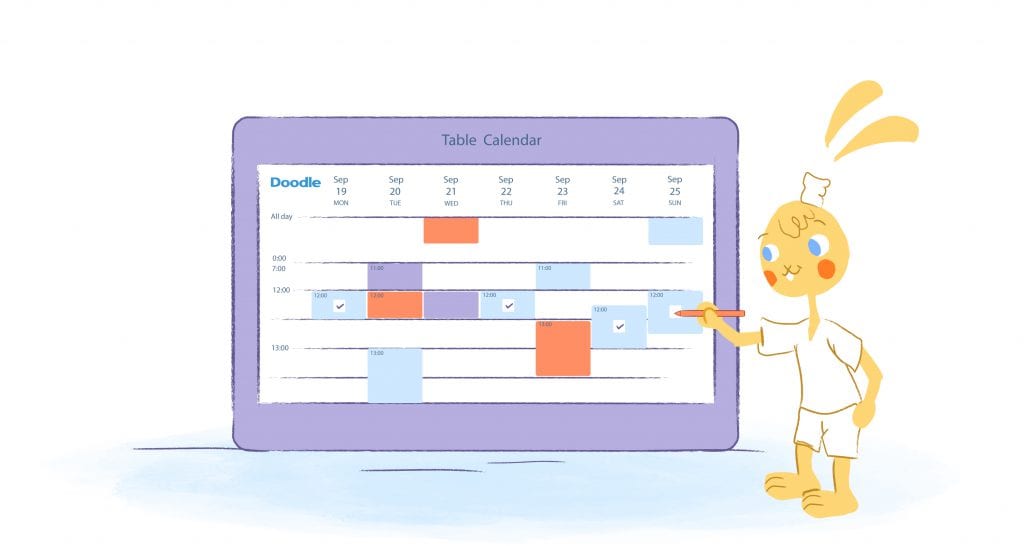

As much joy and festivity as the holiday season brings, it can also be stressful for many people. An American Psychological Association poll found that nearly nine in ten (89%) people are stressed over money, missing loved ones, and anticipating family conflict over the holidays. When juggling family obligations, gift shopping, and event planning, you may feel like this is the most stressful time of the year.
However, by planning ahead and using your calendar strategically, you can easily manage holiday stress. So, let’s look at 12 ways you can turn your calendar into a stress-reducing ally so you can enjoy the season.
1. Block out important dates ASAP.
A significant holiday stressor is the pressure to accomplish everything at once. By setting up your holiday calendar early, though, you will avoid last-minute chaos. An excellent way to do this is to block key dates as soon as the holiday season approaches — or even earlier. This includes holiday parties, family gatherings, school functions, or anything work-related.
Additionally, travel during the holiday season can be stressful because of weather delays, crowded airports, and tight schedules. As such, organize your travel plans in advance using your calendar. Be sure to block off travel days, book flights early, and set notifications when it’s time to check-in. In addition, allow yourself a buffer day after your travels to avoid unexpected delays and adjust to your routine.
Knowing when your time is most limited will help you avoid overcommitting.
Bonus tip: Color-code these dates in your digital calendar to distinguish between work and personal obligations or events. This is a simple and effective way to prioritize and prevent double bookings.
2. Schedule shopping days and set reminders.
There is no doubt that holiday shopping is one of the most time-consuming aspects of the season; rather than squeezing it into your schedule whenever you can, set aside specific times to do it. To counter this, schedule “shopping days” on your calendar and set aside a few hours each time. As a result, you won’t have to rush, and the workload will be spread out, making it much easier to manage.
Think about categorizing your shopping by type: gifts for family, friends, and colleagues or food and decorations. This will allow you to focus on one task at a time rather than bouncing from store to store.
Don’t forget to set reminders for online orders as well. For example, to avoid any last-minute mishaps with late packages, schedule a reminder to review delivery times.
Bonus tip: Keep an eye out for holiday discounts and events by using reminders.
It is common for holiday events and sales to take place on specific days. Whether it’s a Black Friday deal or a Christmas market, put a reminder on your calendar. You can also avoid last-minute stress over late deliveries by scheduling reminders for gift-buying deadlines.
3. Create a budget calendar for financial peace of mind.
The holidays drain bank accounts, no doubt. However, keeping a “budget calendar” can reduce your financial stress. Your calendar lets you know exactly when you will receive or spend money. To stay within your budget, estimate your holiday spending for each gift-shopping day and special occasion.
Also, when your budget is allocated for gifts, set a reminder a few days before each shopping day. This will help you stay on track financially and avoid any surprises in January.
4. Carve out personal time to recharge.
Don’t forget to schedule time for yourself when creating your calendar. After all, with so many obligations during the holidays, there is little time for relaxation. As such, put aside time now and then to relax and recharge.
Your calendar can also serve as a reminder to take a break. Each Sunday in December, for example, you could schedule a “self-care Sunday.” It may be as simple as meditating, watching a holiday movie, or even doing nothing.
Alternatively, you could designate a few “non-event days” throughout the holiday season. On these days, avoid scheduling social gatherings, obligations, or work events. Taking time off for rest or personal time can prevent burnout in times of stress.
You can often set notifications on digital calendars. Consider setting reminders to help you remember these self-care blocks. This will help you stay on top of these plans, even when things get hectic during the holiday season.
5. Organize events and RSVP deadlines.
During the holidays, your inbox will likely overflow with invitations to parties, family gatherings, and even workplace parties. However, by managing your social calendar effectively, you can reduce stress and avoid overscheduling.
You can add each event to your calendar as soon as you receive it, noting whether it’s mandatory or optional. Remember, however, that you cannot attend all events, especially if you have to travel to them. To avoid missing response deadlines and to prevent people from sending extra emails or making phone calls, set RSVP reminders in your calendar.
If you have flexible events or invitations that may come later, you can also leave some “TBD” days on your calendar. As a result, you’ll be able to squeeze in an invite at the last minute without feeling rushed.
6. Set reminders for small tasks and errands.
Shopping, wrapping gifts, mailing cards, and other small errands are all part of the holiday season. When these tasks pile up, they can become overwhelming. To accomplish these small tasks, use your calendar to schedule specific times for them.
For example, set a reminder for you to buy holiday cards by a specific date and another reminder to send them out a week later. If you need baking supplies, schedule a particular day for shopping. When similar tasks are “chunked” together, they are easier to handle, saving time and mental energy.
7. Map out holiday meals.
Are you hosting any meals or get-togethers? If so, planning and preparation are absolutely essential. You can use your calendar to plan when to finalize your menu, shop for ingredients, and prepare meals. Breaking down each meal into smaller steps makes the process less overwhelming.
Also, remind yourself to defrost frozen items a day or two in advance. The last thing anyone wants on a day off is to deal with a frozen turkey.
8. Keep track of family traditions.
There is nothing more meaningful than family traditions during the holiday season. Organizing them, however, can be stressful, especially if several people are involved.
Plan these events well in advance and inform family members early of your plans. For example, if you bake cookies together, go shopping, or decorate every year, place it on your calendar and share it with everyone involved. As a result, back-and-forth communication is reduced, and all parties are on the same page.
If you use a digital calendar, make a family calendar or send event invitations to keep everyone on the same page. This way, everyone knows when and where traditions will occur, minimizing the need for last-minute changes.
9. Set boundaries by blocking “Do Not Disturb” time.
Setting boundaries is essential in a world where work, family, and social obligations pile up. However, to prevent burnout, schedule “do not disturb” time on your calendar. You might use this time for social media breaks, tech-free afternoons, or evenings without calls.
The most important thing is to communicate these times to family and colleagues so they will appreciate your need for time off. You can do this by sharing your calendar with them.
10. Use technology to manage your time.
Using digital tools can make your holiday calendar more productive. A digital calendar, for instance, often includes a task list, which can help you remember smaller details, like picking up holiday ingredients. Using Calendar, for instance, you can set reminders for specific tasks and get smart suggestions so you don’t miss anything.
Additionally, apps such as Todoist, Trello, or Asana can be integrated and tracked seamlessly with your calendar for task management. This can be especially helpful when you’re juggling work-related and personal holiday tasks.
11. Plan for post-holiday wind-down time.
After a busy holiday season, planning for rest is essential. So, when arranging your calendar, be sure to schedule some “recovery days” after the holidays. Perhaps this means a few days without commitments so that you can relax, catch up on sleep, or focus on self-care.
If you’re traveling for the holidays, plan your return with a buffer day before you go back to work. This helps you decompress, unpack, and reset without immediately disrupting a busy schedule.
12. Reflect and adjust for future holidays.
In the wake of the holiday season, review your calendar and determine what worked well and what could be improved. If you feel your days were overstuffed like a turkey, reflect on how you might adjust next year. If you find December weekends too busy, you might spread some activities on some weekends in November.
By reflecting on this year’s calendar, you can plan for less stress during the holiday season in the future.
Final Thoughts
With thoughtful organization, a calendar can be invaluable for managing holiday stress. If you plan ahead, set aside personal time, and schedule tasks strategically, you’ll be able to make the holiday season joyful instead of filled with concern and anxiety.
During this holiday season, let your calendar guide you to a more relaxing, fulfilling, and joyful holiday experience.
FAQs
How can a calendar help me reduce holiday stress?
With a calendar, you can stay organized and manage your commitments more effectively, which can help you feel less stressed.
What type of calendar should I use?
It is possible to use a physical calendar or a digital calendar, like Google Calendar or Outlook.
What are some specific calendar tips for the holidays?
Some specific tips are as follows;
- Create a holiday to-do list. Make your holiday tasks more manageable by breaking them down into smaller, manageable steps.
- Schedule time for shopping. You can avoid last-minute stress by setting aside specific times for shopping.
- Plan your travel. When planning your holiday travel itinerary and booking hotels and flights, use your calendar.
- Schedule time for relaxation. Schedule time for yourself to relax and de-stress, such as by reading, taking a bath, or taking a walk.
How can I use my calendar to manage holiday stress with family and friends?
Listed below are a few tips;
- Coordinate with family and friends. Keep your calendar up-to-date to avoid scheduling conflicts with friends and family.
- Set expectations. Ensure that family and friends are aware of your availability and what you are able to commit to.
- Be flexible. Remember that things don’t always go according to plan, so be flexible and adjust your schedule as needed.
Is there a way to prevent myself from overbooking?
You need to be realistic about what you can handle and say no to things that you don’t have time for.
Image Credit: RDNE Stock project; Pexels











John Hall
John Hall is the co-founder of Calendar a scheduling and time management app. He’s also a keynote speaker that you can book at http://www.johnhallspeaking.com.